| |||||||||||||||||||||||||||||||
2 governorships | |||||||||||||||||||||||||||||||
|---|---|---|---|---|---|---|---|---|---|---|---|---|---|---|---|---|---|---|---|---|---|---|---|---|---|---|---|---|---|---|---|
| |||||||||||||||||||||||||||||||
 Democratic hold | |||||||||||||||||||||||||||||||
United States gubernatorial elections were held in November 1965, in two states.
| |||||||||||||||||||||||||||||||
2 governorships | |||||||||||||||||||||||||||||||
|---|---|---|---|---|---|---|---|---|---|---|---|---|---|---|---|---|---|---|---|---|---|---|---|---|---|---|---|---|---|---|---|
| |||||||||||||||||||||||||||||||
 Democratic hold | |||||||||||||||||||||||||||||||
United States gubernatorial elections were held in November 1965, in two states.
After his re-election win, Richard J. Hughes tried to introduce an income tax, but that bill died. The tax would come into play after the state Supreme Court handed down a decision concerning property taxes for schools in 1973. Hughes became Chief Justice in 1974, and after much battling with then-Gov. Brendan Byrne and the New Jersey Legislature concerning taxes for public education, the income tax finally made it to New Jersey. [1]
The 1965 Virginia's Governor's Race was colorful in that not only a new governor emerged, (Mills E. Godwin, Jr.), who would go on to serve the term as a Democrat and later serve another term as a Republican in the 1970s, [2] but that another opponent, A. Linwood Holton, Jr., would go on to serve a term as Virginia's first Republican Governor since Reconstruction. [3] Not to mention that George Lincoln Rockwell, the American Nazi Party leader, ran in this race under a so called "White constitutional party". [4] [5]
| State | Incumbent | Party | Status | Opposing candidates |
|---|---|---|---|---|
| New Jersey | Richard J. Hughes | Democratic | Re-elected, 57.39% | Wayne Dumont (Republican) 41.08% Robert Lee Schlachter (Conservative) 0.93% Christopher C. Vespucci (Veterans Choice) 0.24% Julius Levin (Socialist Labor) 0.21% Ruth F. Shiminsky (Socialist Workers) 0.14% [6] |
| Virginia | Albertis Harrison | Democratic | Term-limited, Democratic victory | Mills Godwin (Democratic) 47.89% Linwood Holton (Republican) 37.71% William J. Story Jr. (Virginia Conservative) 13.38% George Lincoln Rockwell (Independent) 1.02% [7] |
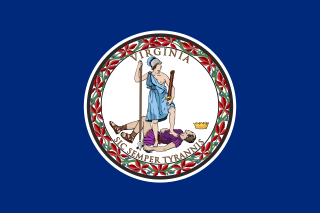
The governor of the Commonwealth of Virginia serves as the head of government of Virginia for a four-year term. The incumbent, Glenn Youngkin, was sworn in on January 15, 2022.

George Lincoln Rockwell was an American Neo-Nazi/fascist activist and exhibitionist. Rockwell founded the American Nazi Party in 1959 and became the self-styled Führer of Neo-Nazism in the United States.

Richard Joseph Hughes was an American lawyer, politician, and judge. A Democrat, he served as the 45th governor of New Jersey from 1962 to 1970, and as Chief Justice of the New Jersey Supreme Court from 1973 to 1979. Hughes is the only person to have served New Jersey as both governor and chief justice. Hughes was also the first Roman Catholic governor in New Jersey's history.

Brendan Thomas Byrne was an American attorney and Democratic Party politician who served as the 47th Governor of New Jersey from 1974 to 1982.
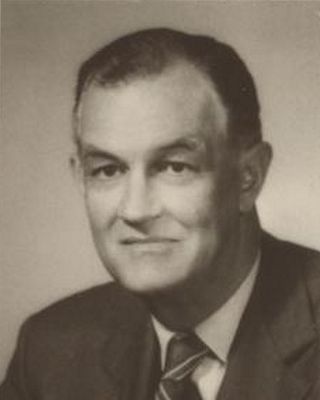
Mills Edwin Godwin Jr. was an American politician who was the 60th and 62nd governor of Virginia for two non-consecutive terms, from 1966 to 1970 and from 1974 to 1978.

Abner Linwood Holton Jr. was an American politician and attorney. He served as the 61st governor of Virginia, from 1970 to 1974, and was the first elected Republican governor of Virginia of the 20th century. He was known for supporting civil rights, integration, and public investment.
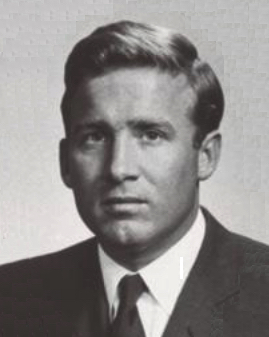
Julian Sargeant "Sarge" Reynolds of Richmond, Virginia, was an American educator, businessman, and Democratic politician. He served in both the House and Senate of the Virginia General Assembly and served as 30th Lieutenant Governor of the Commonwealth of Virginia under Governor Linwood Holton. He died of an inoperable brain tumor at age 34 while in office as Virginia's Lieutenant Governor.

The Byrd machine, or Byrd organization, was a political machine of the Democratic Party led by former Governor and U.S. Senator Harry F. Byrd (1887–1966) that dominated Virginia politics for much of the 20th century. From the 1890s until the late 1960s, the Byrd organization effectively controlled the politics of the state through a network of courthouse cliques of local constitutional officers in most of the state's counties.
Wayne Dumont, Jr. was an American Republican Party politician from New Jersey. He represented Warren County in the New Jersey Senate from 1952 to 1966 and northwestern New Jersey more broadly from 1968 until his retirement in 1990. He was the Republican nominee for Governor of New Jersey in 1965, losing to Richard J. Hughes.
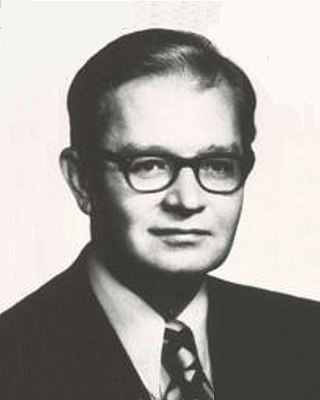
Henry Evans Howell, Jr., nicknamed "Howlin' Henry" Howell, was an American lawyer and politician from the Commonwealth of Virginia. A progressive populist and a member of the Democratic Party, he served in both houses of the Virginia General Assembly, was elected the 31st Lieutenant Governor of Virginia as an Independent Democrat, and made several runs for governor.

Matthew Feldman was an American Democratic Party politician who served as a New Jersey State Senator and Mayor of Teaneck, New Jersey.

Anne Bright Holton is an American lawyer and judge who served as the Secretary of Education for the Commonwealth of Virginia from 2014 to 2016. She is married to United States Senator and former Virginia Governor Tim Kaine, the vice presidential running mate of Hillary Clinton in the 2016 election.

Elections in Virginia are authorized under Article I of the Virginia State Constitution, sections 5–6, and Article V which establishes elections for the state-level officers, cabinet, and legislature. Article VII section 4 establishes the election of county-level officers. Elections are regulated under state statute 24.2-102. The Virginia State Board of Elections oversees the execution of elections under state law. In a 2020 study, Virginia was ranked as the 12th easiest state for citizens to vote in.
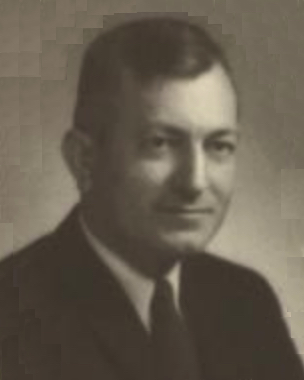
William Benjamin Hopkins Sr. was an American politician, lawyer and military historian.

In the 1973 Virginia gubernatorial election, incumbent Governor A. Linwood Holton, Jr., a Republican, was unable to seek re-election due to term limits. Mills E. Godwin, Jr., former Democratic Governor of Virginia, was nominated by the Republican Party to run against Independent Lieutenant Governor of Virginia Henry Howell. The Democrats did not field a candidate, mostly choosing to support Howell's candidacy.

In the 1969 Virginia gubernatorial election, incumbent Governor Mills E. Godwin, Jr., a Democrat, was unable to seek re-election due to term limits. A. Linwood Holton, Jr., an attorney from Roanoke, was nominated again by the Republican Party to run against former United States Ambassador to Australia, Democratic candidate William C. Battle.

In the 1965 Virginia gubernatorial election, incumbent Governor Albertis Harrison, a Democrat, was unable to seek re-election due to term limits. Linwood Holton, an attorney from Roanoke, was nominated by the Republican Party to run against Democratic Lieutenant Governor of Virginia Mills Godwin.

Nelson Frank Stamler was an American Republican Party politician, prosecutor and judge. He won considerable fame in the 1950s as a racket-busting Deputy state Attorney General who waged a war on illegal gambling operations. His work was also controversial, and eventually terminated by the state Attorney General. He later won elections to the State Assembly and State Senate and served as a Superior Court Judge.
The Conservative Party of Virginia was a United States political party in the state of Virginia during the mid 20th century. The party formed after Mills E. Godwin, Jr. was selected as the Democratic party's candidate for governor in 1965 due to his openly soliciting the votes of African-Americans. 300 delegates met at Richmond, Virginia and formed the party and selected William J. Story, Jr., assistant superintendent of schools, Chesapeake, Va., for Governor; Reid T. Putney, a forestry consultant of Goochland, for Lieutenant-Governor, and John W. Carter for Attorney-General. In 1969 the party ran Beverly McDowell for governor.

Dwight Carter Holton is an American lawyer and politician from Oregon. Born in Roanoke, Virginia, he was approximately four years old when his father, Linwood Holton, was elected governor, becoming the first Republican in one-hundred years to hold that office. The elder Holton, who ran on a platform of racial reconciliation, famously sent his children to majority-Black public schools in Richmond, following court-ordered integration.